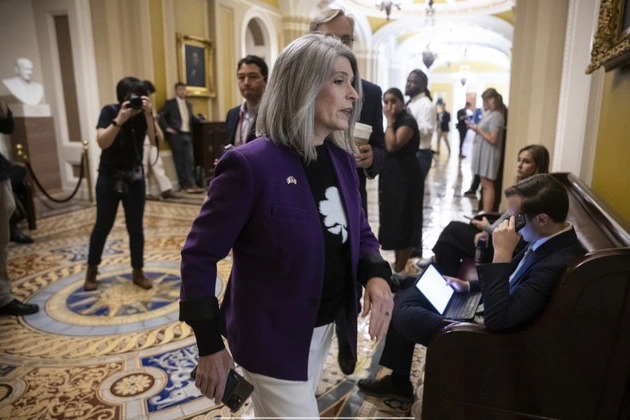
The fate of President Donald Trump’s megabill could come down to a fight over clean energy tax credits, as a handful of Senate Republicans stage a last-minute rally to preserve wind and solar incentives from Democrats’ 2022 climate law.
Conservatives thought they secured a major win ahead of floor action on their megabill when President Donald Trump successfully urged Senate Majority Leader John Thune to crack down on tax credits for wind and solar energy from the Inflation Reduction Act.
Now, a diverse group of Republicans — led by conservative Sen. Joni Ernst (R-Iowa) and including Sens. Lisa Murkowski (R-Alaska) and Chuck Grassley (R-Iowa) — are offering an amendment to undo the harsher language that could get a vote during Monday’s Senate “vote-a-rama.” Sens. Thom Tillis (R-N.C.), John Curtis (R-Utah) and Mike Rounds (R-S.D.) also suggested Monday they were sympathetic to the push to ease the gutting of wind and solar credits.
The Battle for Clean Energy Tax Credits
Murkowski, a key swing vote, told POLITICO last week that Trump-backed requirements would be “disastrous in my state.”
Trump convinced Thune to depart from Senate Finance Committee language backed by moderates allowing wind and solar projects to receive credits based on when they begin construction — reverting to a stricter eligibility standard embedded in the House-passed bill based on when those projects enter into service.
Developers, renewable energy advocates and some Republicans say that metric is difficult because it can be derailed by factors outside of developers’ control — and could lead to the scrapping of planned wind and solar projects needed to meet growing power demand.
The new amendment would essentially return to the Senate Finance text — which proponents saw as a compromise to begin with — by allowing companies that are building wind and solar farms to claim a tax credit worth at least 30 percent of their costs if they start construction this year, with a phaseout over two years.
It would also eliminate an excise tax in the latest megabill draft that would penalize any wind and solar project placed into service after 2027 if it includes material assistance from prohibited foreign entities, including China. That tax — which shocked the renewable energy industry and the broader business community but is supported by some domestic manufacturers — would be applied even to projects not receiving any credits.
“I’m a lifelong conservative, pro-business, pro-growth Republican from a fossil fuel state that has worked in various roles in state government,” said Mitch Carmichael, the former lieutenant governor of West Virginia who now leads Built for America, a newly launched advocacy group. “For the life of me … there would be no justification for wanting to add a new tax on domestic energy production. We should be doing everything we can to drive down the cost of energy.”
Setting the Stage for a Showdown
The amendment could set up a clash of Republicans with energy projects planned for their states with staunch conservatives and Trump administration officials, who vehemently oppose continuing subsidies for intermittent wind and solar resources that they claim are unreliable.
Rounds said Monday afternoon he’s “inclined to support” the Ernst-led amendment. His vote, along with the sponsors and all 47 Democrats, would give it majority support in the Senate.
“If [conservatives] get a few more things to save money, we should be able to get this thing moving,” he said. “It’s critical for the electric needs as we get into AI development. We can’t do it without wind and solar power.”
A key factor to swing its success or failure is whether Senate Budget Chair Lindsey Graham and GOP leaders allow the amendment to proceed on a simple majority vote or a 60-vote supermajority, depending on whether they deem that the senators proposing the amendment have sufficient offsets to make up for the cost of easing the rollbacks.
“We’re talking about that,” Graham said in a brief interview Monday.
If their bid to amend the bill fails, it would put moderates in a major bind, forcing them to choose between rejecting Trump’s agenda or allowing the gutting of tax credits that could lead to canceled projects, job losses and higher electricity prices in their states.
But if it succeeds, and the Senate proceeds to pass the megabill with the softer treatment of wind and solar incentives, it would test House conservatives who then would be pressured to back the bill to ensure it meets Trump’s July 4 deadline.











